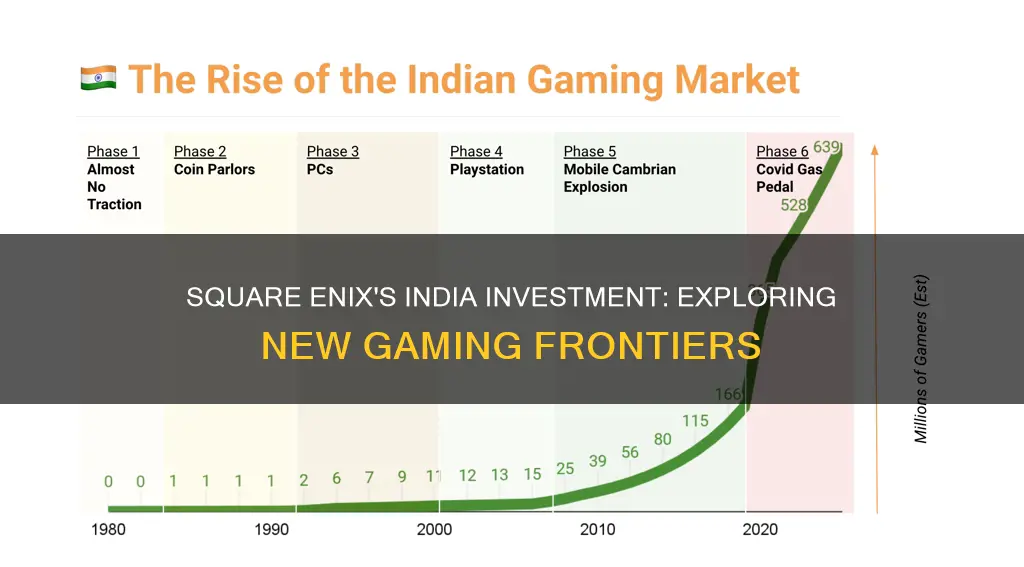
Square Enix is a Japanese multinational holding company, video game publisher, and entertainment conglomerate. In 2020, the company announced its intention to expand its presence in India, citing the country's developing telecommunications and payment infrastructure as key factors in its decision. Square Enix recognises the potential for growth in the Indian market, particularly with the rise of cloud gaming and the implementation of 5G technology. The company's investment in India is part of its strategy to stay at the forefront of new developments in the industry and leverage emerging technologies to drive growth.
| Characteristics | Values |
|---|---|
| Reason for investment | India's "developing telecommunications and payment infrastructure" makes the market "extremely promising" for entertainment consumption |
| Type of investment | Mobile games publishing |
| Location | Bangalore, Karnataka |
| Parent company | SQUARE ENIX Holdings Co., Ltd. |
| Portfolio | FINAL FANTASY®, DRAGON QUEST®, and TOMB RAIDER®, together with other well-established products such as: DEUS EX, KINGDOM HEARTS, and SPACE INVADERS |
What You'll Learn

India's developing telecommunications and payment infrastructure
India's telecommunication network is the second largest in the world, with over 1.2 billion subscribers as of August 2024. The country has one of the lowest call tariffs globally, enabled by multiple large-scale telecom operators and the hyper-competition between them.
The Indian telecom industry has undergone a high rate of market liberalisation and growth since the 1990s and has now become the world's most competitive and one of the fastest-growing telecom markets. The deregulation of Foreign Direct Investment (FDI) norms has made the sector one of the fastest-growing and the top five employment opportunity generators in the country.
The total telephone subscriber base stood at 1,203.69 million in May 2024, with a tele-density of 59.59% for rural subscribers. The total volume of wireless data usage increased by more than tenfold from 4,206 petabytes in Q1, FY18 to 47,629 petabytes in Q2, FY24. India is one of the biggest consumers of data worldwide.
The total number of internet subscribers increased to over 969 million by the end of June 2024, out of which 42% belonged to rural areas. The average monthly data consumption per wireless data subscriber has also increased to 17.36 GB in March 2023 from 61.66 MB in March 2014.
The industry's exponential growth over the last few years is driven by affordable tariffs, wider availability, roll-out of Mobile Number Portability (MNP), expanding 3G and 4G coverage, evolving consumption patterns of subscribers, government initiatives towards bolstering India's domestic telecom manufacturing capacity, and a conducive regulatory environment.
The government has approved the auction of IMT/5G spectrum for the deployment of 5G services within the country. The auction was successfully held by the end of July 2022 and grossed $18.77 billion. The telecom sector is the fourth-largest sector in terms of FDI inflows, contributing 6% of the total FDI inflow.
Investment Management Lawyers: Guiding Your Financial Journey
You may want to see also

The market for entertainment consumption
The company's investment strategy is influenced by the desire to stay at the forefront of new developments, such as AR glasses, XR, and blockchain, which they view as "opportunities". With the integration of new technologies, Square Enix aims to enhance its entertainment offerings and stay competitive in the evolving digital landscape.
Square Enix's expansion into India is part of a broader "aggressive" overseas growth strategy. The company has set its sights on increasing its presence in the region and capitalising on the growing market for entertainment consumption. This aligns with their goal to provide high-quality, innovative content, services, and products to a wider audience.
The company's diverse range of content and services includes well-known franchises such as Final Fantasy, Dragon Quest, and Tomb Raider. With a strong portfolio of intellectual property, Square Enix is well-positioned to leverage its brands and expand its global reach, including in the Indian market.
Square Enix's investment in India is a strategic move to tap into the country's promising market for entertainment consumption, driven by advancements in telecommunications and payment infrastructure. This expansion aligns with their commitment to delivering high-quality, creative content and their recognition of the potential for cloud gaming and emerging technologies.
Understanding Self-Employment Through Investment Management
You may want to see also

Increased interest in Japan's mobile game market
Square Enix Holdings Co., Ltd. is a Japanese multinational entertainment conglomerate that has been expanding its global presence since its formation in 2003. In 2020, the company's president, Yosuke Matsude, announced plans to grow its business in India, citing the country's developing telecommunications and payment infrastructure as a key factor in making the Indian market extremely promising for the consumption of digital entertainment.
While Japan's mobile game market has experienced slowed growth, with bestselling games remaining at the top for large parts of the year, there is an increased interest in this market. Matsude believes that consumers will be seeking new and original gaming experiences more than ever, and companies that can provide these will be well-positioned to succeed in this new era.
Square Enix's mobile division has been a significant contributor to the company's profits, with a 33% increase in profits from games for the six months ended September 30, 2019. The company has also been investing in cloud gaming, recognising the role that 5G technology will play in the coming years. They have expressed interest in leveraging cloud gaming to drive new growth and stay at the forefront of the industry.
As part of its global expansion strategy, Square Enix has been actively investing in and acquiring studios and intellectual properties. The company has a diverse range of content and service businesses, including well-known franchises such as Final Fantasy, Dragon Quest, and Tomb Raider. With its focus on creativity, innovation, and high-quality entertainment, Square Enix is well-positioned to capitalise on the growing demand for mobile gaming experiences in Japan and beyond.
Morgan Stanley: Leading the Way in Investment Management
You may want to see also

The role of 5G and cloud streaming
Square Enix is a Japanese multinational entertainment conglomerate that develops and publishes video games. The company has expressed interest in cloud gaming and cloud-exclusive games, believing that the advent of 5G technology will usher in a new era of gaming.
Cloud gaming will enable Square Enix to stream its popular games, such as Final Fantasy and Dragon Quest, directly to players' devices, including phones, tablets, desktops, and consoles. This distribution model will not only provide players with convenient access to their favourite games but also accelerate the transition from traditional disk-based sales to digital sales.
Moreover, 5G technology will enable Square Enix to develop cloud-native or cloud-centric titles, creating new gaming experiences that leverage the power of centralised computing. These games will be designed specifically for the cloud, taking advantage of the high-speed, low-latency connections that 5G networks provide.
In addition to its own streaming ambitions, Square Enix is also investing in blockchain and cloud services companies such as Zebedee, Blocklords, Cross The Ages, and Ubitus. By embracing new technologies and distribution platforms, Square Enix aims to stay at the forefront of the digital entertainment industry.
Square Enix's commitment to cloud gaming and 5G technology is evident in its recent investments and statements. The company recognises the potential of cloud streaming to revolutionise the gaming industry, and it is positioning itself to be a key player in this new era of gaming.
Building an Investment Portfolio: A Beginner's Guide for India
You may want to see also

The potential of blockchain technology
Blockchain technology has far-reaching applications across many industries. While it is most famous for its role in facilitating the popularity of cryptocurrency, there are also many other non-cryptocurrency uses. Blockchain technology has the potential to be used in conjunction with emerging technologies and its applications are likely to be discovered in the future.
Blockchain is a distributed ledger technology (DLT) that uses cryptography to store data across computer networks. It has been billed as a solution to almost every challenge known to humanity, from financial inclusion to improving productivity in developing economies. The true believers think blockchain could eliminate the need for intermediaries in a wide array of transactions and transform virtually every corner of the global economy, including energy markets and supply chains.
One of the most promising applications of blockchain is in global supply chains. The cost of operating supply chains has risen due to their increased complexity and digitisation. Blockchain may be the solution to the logistical, cost, and transparency issues that plague their growth. For example, a blockchain-enabled workflow automation and auto-reconciliation for inventory can reduce costs for both consumers and producers. The distributed ledger model could also improve access for regulators and authorities with respect to collecting taxes and customs duties.
Another promising application of blockchain is in identity management. Blockchain offers a high level of security, thanks to independent verification processes that take place across member computers on a blockchain network. This mechanism could be applied to identity verification and other applications. For example, blockchain could be used to aid in maintaining voter information and ensuring the proper functioning of the electoral process. It could also be used to securely and efficiently transfer user data across platforms and systems, as well as to maintain and protect real estate ownership records, titles, and more.
Smart contracts are another powerful application of blockchain technology. These computer programs can initiate and automate the required actions written into an actual contract. When certain conditions are met, smart contracts execute the actions they are programmed to perform. Smart contracts provide a more secure, more automated alternative to trusting that another party will fulfil their obligations. The potential applications of smart contract technology are essentially limitless and could extend to almost any field of business in which contract law would normally apply.
Blockchain technology is also being used to facilitate cross-border payments. Traditionally, the transfer of value across international borders has been both expensive and slow. Blockchain technology has the potential to provide a much faster and cheaper alternative to traditional methods. While typical money remittance costs might be as high as 20% of the transfer amount, blockchain may allow for costs at just a fraction of that, as well as guaranteed and real-time transaction processing speeds.
In summary, blockchain technology has a broad range of potential uses beyond its connections to cryptocurrency. It has the potential to revolutionise supply chains, identity management, smart contracts, cross-border payments, and more. As new ways of utilising blockchain emerge daily, it is essential to develop an understanding of this technology and how it may be used in the future.
Change Management: Invest in Your Business's Future Success
You may want to see also
Frequently asked questions
Square Enix is investing in India because of the country's developing telecommunications and payment infrastructure, which makes the market "extremely promising" for entertainment consumption.
Square Enix (India) Pvt. Ltd.
Bangalore, Karnataka.
Mobile games and publishing.







